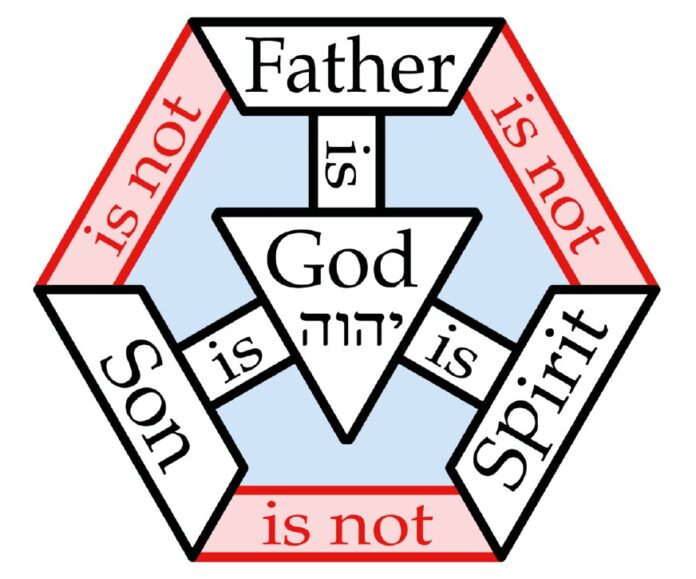The doctrine of the Trinity states that God consists of three co-equal persons—God the Father, God the Son and God the Holy Spirit. It is a fundamental teaching of most churches. It is therefore of the utmost importance that we ask the question—is it true?
In one word—no! When we look to the Bible’s Old Testament, we see that the Jewish God was emphatically one God: ‘Hear, O Israel: The Lord our God, the Lord is one’ (Deuteronomy 6:4). There is no hint in the Old Testament that God consists of three persons.
So we turn to the New Testament. Jesus Christ endorsed the Old Testament’s statement. When he was asked, ‘”Which commandment is the most important of all?” Jesus answered, “The most important is, ‘Hear, O Israel: The Lord our God, the Lord is one”’ (Mark 12:28–29).
Jesus the Son of God
Jesus Christ is presented as the Son of God. For example, ‘These are written so that you may believe that Jesus is the Christ, the Son of God, and that by believing you may have life in his name’ (John 20:31). Nowhere does the phrase “God the Son” occur in the Bible.
The Apostle Peter, speaking to the crowds in Jerusalem after the ascension of Christ to heaven, referred to him thus: ‘Jesus of Nazareth, a man attested to you by God with mighty works and wonders and signs that God did through him in your midst’
(Acts 2:22). Explaining the miraculous healing of a lame man Peter said, ‘The God of Abraham, the God of Isaac, and the God of Jacob, the God of our fathers, glorified his servant Jesus’ (3:13). The Apostle Paul, too, wrote thus: ‘There is one God, and there is one mediator between God and men, the man Christ Jesus’ (1 Timothy 2:5).
It is argued that Jesus was not merely revered but worshipped, and that he is therefore God. It is true that men worshipped Christ (for example Matthew 14:33), but that did not make him God.
The Holy Spirit
The Holy Spirit is presented in the Bible as the power of God, not as a person within the godhead. The power of God was exhibited by Jesus in the ‘mighty works and wonders and signs that God did through him’ (Acts 2:22). He explained, ‘My Father is working until now, and I am working’ (John 5:17).
He said to his disciples before he ascended to heaven, ‘Behold, I am sending the promise of my Father upon you. But stay in the city until you are clothed with power from on high’ (Luke 24:49). This was fulfilled shortly afterwards on the day of Pentecost, when ‘they were all filled with the Holy Spirit and began to speak in other tongues as the Spirit gave them utterance’ (Acts 2:4).
There is no suggestion of personality in the Bible’s description of the Holy Spirit. A man named Simon actually offered the Apostle Peter money, saying ‘Give me this power also, so that anyone on whom I lay my hands may receive the Holy Spirit’, and received a well earned rebuke, ‘May your silver perish with you, because you thought you could obtain the gift of God with money!’ (Acts 8:19–20).
It was this Holy Spirit which came upon Mary the mother of Jesus: ‘And the angel answered her, “The Holy Spirit will come upon you, and the power of the Most High will overshadow you; therefore the child to be born will be called holy—the Son of God”’ (Luke 1:35).
Mystery
Proponents of the doctrine of the Trinity admit that the distinctive characters of the three persons within the Godhead are not shown in the Bible—but they claim that the Trinity is implied. When challenged to explain it in simple understandable terms, they decline to do so on the grounds that it is “a mystery”.
There is nothing mysterious, or com-plicated, or impossible to express clearly, about the simple truths in the Bible. God is revealed to us as the Creator and Sustainer of all things: ‘In him we live and move and have our being’ (Acts 17:28). His relationship with His Son is clearly expressed:
God so loved the world, that he gave his only Son, that whoever believes in him should not perish but have eternal life (John 3:16).
God does not have a high opinion of those who construct clever arguments which serve to obscure His truth. ‘Where is the one who is wise? Where is the scribe? Where is the debater of this age? Has not God made foolish the wisdom of the world?’ (1 Corinthians 1:20). The doctrine of the Trinity presents a false idea of God and His beloved Son. This is a serious matter. Jesus himself once said, ‘This is eternal life, that they know you, the only true God, and Jesus Christ whom you have sent’ (John 17:3).
John Owler



